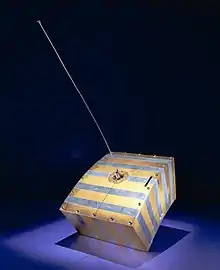| Mission type | Amateur radio satellite |
|---|---|
| Operator | Weber State University / AMSAT[1] |
| COSPAR ID | 1990-005F |
| SATCAT no. | 20441 |
| Spacecraft properties | |
| Bus | Microsat |
| Launch mass | 12 kilograms (26 lb) |
| Start of mission | |
| Launch date | 22 January 1990, 01:44:35 UTC |
| Rocket | Ariane-40 H10[2] |
| Launch site | Kourou ELA-2 |
| End of mission | |
| Last contact | 1998 |
| Orbital parameters | |
| Reference system | Geocentric |
| Regime | Low Earth |
| Eccentricity | 0.00119 |
| Perigee altitude | 777 km (483 mi) |
| Apogee altitude | 794 km (493 mi) |
| Inclination | 98.2° |
| Period | 100.57 minutes |
| Epoch | 22 January 1990[3] |
Weber-OSCAR 18 (also called WeberSAT, Microsat 3 and WO-18) is an American amateur radio satellite.[4]
The satellite was jointly developed, built by the Weber State College Center for Aerospace Technology and AMSAT, and on January 22, 1990, as a secondary payload, along with the SPOT 2 Earth observation satellite with an Ariane 4 from the Guiana Space Centre, Kourou, French Guiana.
The satellite had an AX.25 digipeater with uplink in the 2-meter band and downlink in the 70-centimeter band, as well as a CCD camera for color images and a piezoelectric detector for micrometeorites.
It was in operation until 1998.
See also
External links
References
- ↑ Radio Amateur Satellite Corporation. "Orbiting Satellites Carrying Amateur Radio". Retrieved 10 February 2020.
- ↑ Gunter Dirk Krebs. "Webersat (WO 18, Webersat-OSCAR 18)". Gunter's Space Page. Retrieved 10 February 2020.
- ↑ NASA Goddard Space Flight Center. "OSCAR 18". NSSDCA Master Catalog. Retrieved 10 February 2020.
- ↑ Jos Heyman: Spacecraft Tables, 1957-1990. Univelt, 1991
This article is issued from Wikipedia. The text is licensed under Creative Commons - Attribution - Sharealike. Additional terms may apply for the media files.
